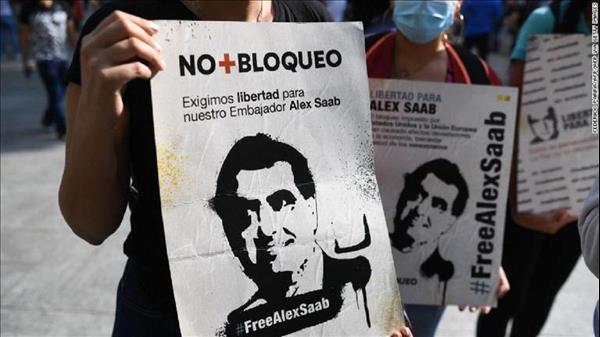
Alex Saab's Lawyers Demand US Courts Uphold Diplomatic Immunity, Warn of 'Dangerous' Precedent
Guayaquil, Ecuador, April 6, 2022 (venezuelanalysis.com ) – The defense of Venezuelan government special envoy Alex Saab has begun a judicial battle before a US appeals court to have his diplomatic immunity recognized and secure an immediate release.
A first hearing took place on Wednesday before a three-judge panel in Miami, with no clear indication of whether a ruling is to be expected in the coming days. If Saab's immunity is rejected, the trial for alleged conspiracy to launder money would begin on October 11 at the Miami Federal Courthouse with Judge Robert Scola. A preparatory session is set for June 10.
Saab's lawyers have built a defense case around the violation of the Colombo-Venezuelan businessman's diplomatic status as a special envoy to Iran when he was arrested in Cape Verde in 2020 under US government orders.
On Wednesday's session, Saab's legal team presented evidence of his diplomatic status, including the special envoy to Iran designation dated April 9, 2018, and signed by then-Venezuelan Foreign Affairs Minister Jorge Arreaza. A diplomatic note from Iran's Embassy in Caracas backing the claim was also submitted to the judges. These documents, along with others pertaining to the case, are available online .
According to the memo addressed to Iranian authorities, Saab's diplomatic role was to“procure humanitarian goods and services for the [Venezuelan] government's social programs,” especially food, medicine, fuel and machinery parts. Prior to his arrest, the special envoy had traveled to Tehran on several occasions.
In a recent interview , lead attorney David Rivkin explained that the Vienna Convention on Diplomatic Relations“requires absolute inviolability of ambassadors and special envoys” which means that Saab cannot be“arrested, charged, extradited or prosecuted.”
As part of the defense argument, Rivkin asserted that Saab's case could set a“dangerous” precedent for international diplomacy.“This is essential. If the US violates the diplomatic immunity of ambassadors and special envoys from other countries, I guarantee that someone will do the same to American diplomats,” he stated.
'We hope to have good results in the recognition of Alex Saab's diplomatic immunity and obtain his immediate release,” concluded Rivkin.
For its part, the US prosecutor's argument centers on recently disclosed documents about Saab's alleged cooperation with the US Drug Enforcement Administration (DEA) since June 2018 to provide information about“bribes and crimes' committed on Caracas' behalf. The allegations have been strongly denied by the Venezuelan envoy's lawyers.
“The sole purpose of the meetings with the [US] Department of Justice was to confirm that neither Saab nor any companies associated with him had done anything wrong,” read a communique issued on February 16.
The Nicolás Maduro government has likewise reiterated that Saab is a trusted business ally and was given diplomatic immunity to help secure essential imports amidst US sanctions , playing a critical role in trade agreements between Iran and Venezuela. Caracas has repeatedly accused Washington of“kidnapping” the Venezuelan envoy in a politically motivated case.
Saab's extradition also had political consequences that derailed the Norway-brokered negotiations between the Venezuelan government and the US-backed opposition held in Mexico City. However, in early March President Maduro announced the reactivation of the dialogue process after receiving a high-level US delegation reportedly to eventually discuss sanctions relief.
Currently, Saab is being detained in a Miami prison. On June 12, 2020, the Venezuelan envoy was arrested during a refueling stopover in Cape Verde on his way to Iran to close food, medicine, and fuel import deals. According to his lawyers, he spent months jailed in isolation, without medical care and enduring several other forms of torture.
The Cape Verdean authorities ignored two rulings from the Economic Community of West Africa Court (ECOWAS) ordering Saab's release after finding a number of irregularities, including the absence of an Interpol warrant at the time of the arrest. On June 8, 2021, the African nation also disregarded a directive by the United Nations Human Rights Committee to suspend Saab's extradition to the US.
After a protracted legal battle, on September 8, 2021, Cape Verde's Constitutional Court greenlighted the extradition and the Maduro government envoy was flown to Florida on October 16, without the knowledge of his lawyers and family.
In the US, Saab faced eight charges of money laundering purportedly using state contracts to import goods for Venezuela's Great Housing Mission (GMVV) and the government-subsidized CLAP food program.
On November 1, 2021, judge Scola dismissed seven out of the eight money-laundering charges, leaving one lone count of conspiracy to launder money. Two weeks later, Saab pleaded not guilty .
Saab's judicial struggle to have his diplomatic immunity upheld has dominated the international solidarity scene with the #FreeAlexSaab campaign staging protests around the world. On Tuesday, Venezuelan social movements held a rally in Caracas' largest popular neighborhood Petare calling for the freedom of the Venezuelan special envoy.
Women-led grassroots organization CODEPINK likewise held a demonstration on Saturday in Washington D.C. demanding the Biden administration free Saab.“Evading sanctions isn't a crime, sanctions are the crime!”, exclaimed the US-based activists.
Edited by Ricardo Vaz from Caracas.
MENAFN06042022000214011058ID1103972835

Legal Disclaimer:
MENAFN provides the
information “as is” without warranty of any kind. We do not accept
any responsibility or liability for the accuracy, content, images,
videos, licenses, completeness, legality, or reliability of the information
contained in this article. If you have any complaints or copyright
issues related to this article, kindly contact the provider above.


















Comments
No comment